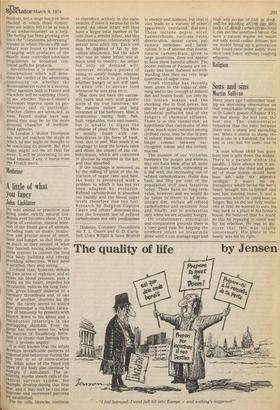Sons and sins
Martin Sullivan
Many years ago I remember reading an interesting observation on that remarkable trilogy of stories in St Luke's gospel (Chapter XV), the lost sheep, the lost coin, the lost son. The commentator remarked that the ratio between them was a sharp and ascending one. When it comes to sheep, the loss is one in a hundred; for coins one in ten; but for sons, one in two.
A man whose child has gone from him is split down the middle. There is a parable within the parable. I have always felt it unfortunate that the third and greatest of these stories should have been left with the adjective 'prodigal.' It wasn't his extravagance which broke the boy's heart, brought him to himself and sent him running home. It was a separation which he could bear no longer. But he did not fully realise this at first: he wanted to earn his "way back to a place in his father's house. He believed that he could do this by repaying in some way for his rebellion. He was to discover that this was totally unnecessary. His place in the family was his by right.
The usual lessons drawn from this great story seem either to centre around a rather indulgent treatment of the younger son with some very severe strictures passed on the elder brother, or to express sympathy for the rather arbitrary treatment meted out to this stolid, loyal, stay-at-home member of the family.
These essays entirely miss the point which Christ was making. He put both the boys under the same judgement. It wasn't the younger's wild bout of living or the elder's churlishness which was to be our object lesson. It was the fact that both of them believed and acted upon the false assumption that they were obliged to behave in such a way that they could win their father's love. He would care for them and provide for them only if they did their part, and if they failed they had to pay the price demanded of them, in order to be restored. The prodigal makes this the whole basis of his approach. At the very end of his tether, he decides to return, and hopes to restore his relationship with his father on a contractual basis. "If I comb my hair, cut my nails, put my clothes to right, I may pierce my father's armour." It is interesting to notice that the speech he prepared and recited to himself was not completed. His father broke in upon it and ordered that he should be dressed and received as a special and honoured guest. His brother who was too meanspirited to come into the house put up exactly the same case. Annoyed by and jealous of his young brother's reception, he sulked and moaned so much that the father had to come and deal with him as well. "You know," he said, "how I have slaved for you all these years; I never once disobeyed your orders and you never gave me so much as a kid for a feast with my friends." Here was the reverse of what had just been happening; recognition on the one hand had been given for no effort at all, and on the other denied after years of loyal service. What kind of father is this?
The answer surely is that he is a proper one. He is not an arbitrator, an employer, a judge, or a task master. He is a father whose relationship with his sons could never be a commercial one. Perhaps St Paul had the parable in mind (had someone told it to him?) when he wrote his inspired sentence, "While we were yet sinners Christ died for us." The father in this story had to come out to both his sons, running over halfway to meet the wayward rascal and trudging over his fields to comfort the righteous one and he made demands on neither. It was the sinner who understood; he just accepted what was so freely and willingly given. The good man was stiff and unbending. Perhaps the parable needs to be retold. The modern sinner and the modern churchman find it very difficult to accept this teaching. They keep looking at each other. If both would turn for a moment and look at Christ, they might find reconciliation.



































 Previous page
Previous page